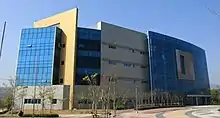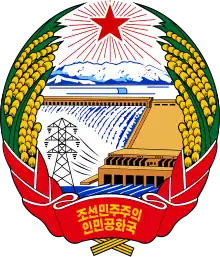| 남북공동연락사무소 | |
 | |
 | |
| Agency overview | |
|---|---|
| Formed | 14 September 2018 |
| Dissolved | 16 June 2020 |
| Jurisdiction | |
| Headquarters | Kaesong Industrial Region, North Korea 37°55′58.7″N 126°37′18.7″E / 37.932972°N 126.621861°E |
| Agency executives |
|
| Inter-Korean Liaison Office | |||||||
|---|---|---|---|---|---|---|---|
| North Korean name | |||||||
| Chosŏn'gŭl | 북남공동련락사무소 | ||||||
| Hancha | 北南共同連絡事務所 | ||||||
| |||||||
| South Korean name | |||||||
| Hangul | 남북공동연락사무소 | ||||||
| Hanja | 南北共同連絡事務所 | ||||||
| |||||||
The Inter-Korean Liaison Office (Korean: 남북공동연락사무소) was a joint liaison office of North Korea and South Korea located in North Korea's Kaesong Industrial Region.
In the absence of formal diplomatic relations, the building functioned as a de facto embassy and provided a direct communication channel for the two nations.[1] It was headed by North Korean Representative Jon Jong-su (전종수), vice chairman of the Committee for the Peaceful Reunification of the Fatherland and South Korean Representative Chun Hae-sung (천해성), vice minister of the Ministry of Unification.
The four-story office building was demolished by North Korea on 16 June 2020. It had been vacant since January due to the COVID-19 pandemic in Korea.
History
The joint liaison office was established as part of Panmunjom Declaration signed by North Korean leader Kim Jong-un and South Korean President Moon Jae-in on 27 April 2018, during the 2018 inter-Korean Summit in Panmunjom. The office was located in a four-story and a basement building with an area of 4,498.57 m2 (48,422.2 sq ft) constructed in 2005 for the Inter-Korean Exchange and Cooperation Consultation Office. The construction cost at the time was 8.0 billion KRW ($7.1 million) paid by the South Korean government.[2] On 11 October 2018, it was reported that a water treatment plant which will be used by the Inter-Korean Liaison Office had been restored.[3] By 25 October 2018, renovation and repairs to the building which houses the Inter-Korean Liaison Office were complete.[4] The South Korean government spent 9.7 billion KRW ($8.6 million) on these renovations.[5]
The first meeting at the Liaison Office occurred between delegates from both Koreas on 22 October 2018 and concerned, among other things, forestry cooperation between both Koreas.[6] A meeting took place at the office between South Korean Vice Minister of Culture, Sports and Tourism Roh Tae-kang and North Korean Vice-Minister of Physical Culture and Sports Won Kil-u on 2 November 2018, talks at the office resulted in bids for a unified Korean team at the 2020 Olympics and to hold the 2032 Summer Olympics in both Koreas.[7][8] Another meeting was held on 2 November 2018 between South Korean Vice Unification Minister Chun Hae-sung (천해성) and his North Korean counterpart, Jon Jong-su (전종수).[9][10] Both men were co-heads of the office and each serve as liaison chief for their perspective country.[9][10] Both Chun and Jon discussed cooperation in various joint-Korean projects.[9][10]
Due to measures taken to contain the COVID-19 pandemic in Korea, the office was closed on 30 January 2020.[11]
Destruction of building
On 16 June 2020 at 2:50 pm, the four-story building was demolished by North Korea.[12] North Korea's news agency, the Korean Central News Agency released a statement saying that "the liaison office was tragically ruined with a terrific explosion" and that it reflected "the mind-set of the enraged people" of their country.[13] On 13 June, three days before the building was destroyed, Kim Yo-jong, the sister of Kim Jong-un, had predicted the collapse of the building as a retaliation for a failure by South Korea to crack down on North Korean defectors living in South Korea who used balloons to send anti-North Korean regime leaflets across the border.[14][15]
The destruction coincided with the 20th anniversary of the first inter-Korean summit between Kim Dae-jung and Kim Jong-il.[16] Surveillance cameras in South Korea showed that when the building was destroyed, a neighboring high-rise building that previously housed South Korean officials partially collapsed due to the strength of the blast.[17]
South Korean president Moon Jae-in responded by heightening the South Korean military's alert level and saying there would be a stern response if North Korea continued to raise tensions.[18] A statement released by the Blue House, South Korea's executive office, said that the building's destruction "is an act that goes against the expectations of those who wish for the development of South-North relations and the settlement of peace on the Korean Peninsula," and that "the government makes it clear that the responsibility for everything that follows this is entirely on the North's side."[5]
See also
References
- ↑ Choe Sang-Hun (14 September 2018). "North and South Korea Open Full-Time Liaison Office at Border". The New York Times. Archived from the original on 25 September 2019. Retrieved 15 September 2018.
- ↑ "남북 '상설 대화창구' 21개월 만에 콘크리트 잔해만 남아" [Inter-Korean “permanent dialogue” only the debris of concrete remains after the 21st months]. The Hankyoreh. 16 June 2020. Archived from the original on 16 June 2020. Retrieved 17 June 2020.
- ↑ Lee Je-hun (11 October 2018). "Water treatment plants in Kaesong Industrial Complex reopened along with joint liaison office". The Hankyoreh. Archived from the original on 18 October 2018. Retrieved 1 November 2018.
- ↑ Dagyum Ji (24 October 2018). "Seoul spent USD$8.6 million on inter-Korean liaison office renovation: MOU". NK News. Archived from the original on 6 November 2018. Retrieved 1 November 2018.
- 1 2 Jeongmin Kim; Oliver Hotham (16 June 2020). "North Korea demolishes inter-Korean liaison office at Kaesong". NK News. Archived from the original on 16 June 2020. Retrieved 17 June 2020.
- ↑ Lee Je-hun (22 October 2018). "Forestry cooperation meeting held on Oct. 22 at inter-Korean joint liaison office". The Hankyoreh. Archived from the original on 6 November 2018. Retrieved 2 November 2018.
- ↑ "S. Korean delegation holds sports talks with N. Korea". Yonhap News Agency. 2 November 2018. Archived from the original on 21 June 2020. Retrieved 21 May 2020.
- ↑ Dagyum Ji (2 November 2018). "Two Koreas agree to submit bid on co-hosting 2032 Summer Olympics". NK News. Archived from the original on 2 November 2018. Retrieved 2 November 2018.
- 1 2 3 Ock Hyun-ju (2 November 2018). "Liaison office chiefs from 2 Koreas hold meeting". The Korea Herald. Archived from the original on 2 November 2018. Retrieved 2 November 2018.
- 1 2 3 "Koreas hold meeting of liaison office chiefs amid delayed cross-border projects". Yonhap News Agency. 2 November 2018. Archived from the original on 21 June 2020. Retrieved 21 May 2020.
- ↑ Berlinger, Joshua; Kwon, Jake; Seo, Yoonjung (16 June 2020). "North Korea blows up office used for talks with South". CNN. Archived from the original on 16 June 2020. Retrieved 16 June 2020.
- ↑ "Alert: South Korea says North Korea blew up an inter-Korean liaison office amid rising tensions between the rivals". SFChronicle.com. 16 June 2020. Archived from the original on 17 June 2020. Retrieved 16 June 2020.
- ↑ Sang-Hun, Choe (16 June 2020). "North Korea Blows Up Liaison Office Shared With South Korea". The New York Times. Archived from the original on 14 February 2021. Retrieved 16 June 2020.
- ↑ Joshua Berlinger; Jake Kwon; Yoonjung Seo (16 June 2020). "North Korea blows up liaison office in Kaesong used for talks with South". CNN. Archived from the original on 16 June 2020. Retrieved 16 June 2020.
- ↑ "North Korea Warns That Inter-Korean Liaison Office May Be 'Collapsed'". The Diplomat. 15 June 2020. Archived from the original on 16 June 2020. Retrieved 16 June 2020.
- ↑ "South Korea president calls for calm after North threatens military steps". CBC News. 15 June 2020. Archived from the original on 16 June 2020. Retrieved 15 June 2020.
- ↑ "North Korea blows up liaison office as tensions rise with South". Al Jazeera English. 16 June 2020. Archived from the original on 16 June 2020. Retrieved 16 June 2020.
- ↑ "North Korea blows up South Korea joint office in rebuke of Seoul". The Japan Times. 16 June 2020. Archived from the original on 8 July 2020. Retrieved 16 June 2020.

